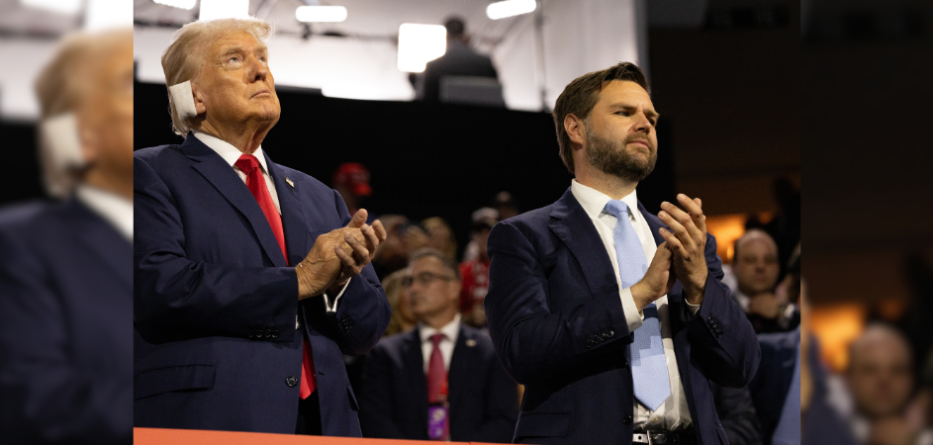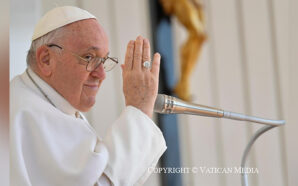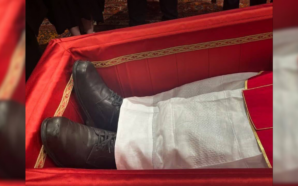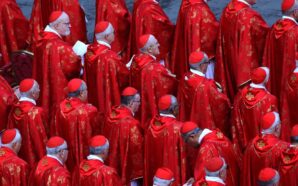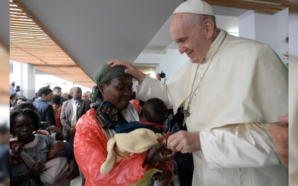In the 2024 US presidential election, Catholics voted for Donald Trump over Kamala Harris by a 15-point margin: 56 to 41 per cent. Catholics are also prominently placed in the Trump administration — four of the most notable being Secretary of State Marco Rubio, border czar Tom Homan, White House Press Secretary Karoline Leavitt and, of course, Vice President J.D. Vance. Catholic officials, moreover, have supported Trump, with Cardinal Timothy Dolan of New York praising him and leading a prayer at his inauguration.
So one could be forgiven for thinking that President Trump’s MAGA policies must hew closely to Catholic and Christian positions on social, ethical and political issues. In fact, the proposed policies and actions of the Trump administration could not be more remote from important Catholic and Christian principles. Judging by its actions, this is the most un-Catholic (to say nothing of un-Christian) administration in living memory.
On policies ranging from immigration to the alleviation of poverty, and even including international relations, the Trump administration is pursuing an agenda that runs contrary to Catholic social teaching and Christian charity. One only need point to its deportation of illegal immigrants to Guantánamo Bay, its decision to dismantle the United States Agency for International Development (USAID) and its pursuit of an unjust peace in Ukraine.
To make matters worse, in some cases members of the Trump administration have misleadingly used Catholic thinking to try to justify cruel policies and impart a veneer of Christian righteousness to their actions. Most recently, Vice President Vance employed the words of Saint Thomas Aquinas in an attempt to justify their immigration crackdown. And Trump himself announced in his inaugural address that he was “saved by God to make America great again”.
Now, hypocrisy is nothing new in the world of politics. Nevertheless, it is important to call out this disconnection so that citizens, especially Catholics and Christians, can reflect clearly on and respond appropriately to the policies of the Trump administration. Although there has been some pushback by Catholic officials — including Cardinal Robert McElroy of Washington DC and Bishop Mark Sietz of El Paso, particularly on the topic of immigration —US Catholics have, on the whole, been disconcertingly quiet regarding MAGA policies.
But the Catholic world is not without voice. Despite being seriously ill, Pope Francis has been vocally critical of Trump himself, he has explicitly rebuked Vance and chastised the US bishops for their reluctance to confront the administration directly. Through his theological writings and pastoral exhortations, Pope Francis has consistently pointed the world toward a strong critique of Trumpian politics, helping us to understand how MAGA ideology has inverted Christian values and blinded its supporters to the true needs of others.
Immigration
To date, the most direct confrontation between Pope Francis and MAGA Republicans has been over the topic of immigration. True to his campaign pledges, Trump commenced a highly dramatised immigration crackdown in which celebrities like “Dr Phil” McGraw accompany agents on their televised raids. The president has even authorised officials to pursue illegal immigrants in areas that have traditionally been out of bounds — including churches and schools.
The safe spaces of educational institutions and houses of worship were created to ensure that immigrants’ freedom of worship and right to education were respected. Therefore, by sensationalising enforcement activities and breaking with the historical protections that have been afforded to such safe spaces, the Trump administration is sending a clear message that illegal immigrants are “other” and thus not worthy of recognition as equal persons.
Trump has also blocked the funding of refugee resettlement services provided by religious organisations such as the US Conference of Catholic Bishops’ migration and refugee services and the Lutheran refugee resettlement program, Global Refuge. In targeting these services, administration officials such as billionaire Elon Musk and Vice President Vance have falsely claimed that these organisations support illegal immigrants and are engaged in money laundering and fraud. When bishops protested the funding block, Vance went so far as to question their sincerity:
I think that the [US Conference of Catholic Bishops] needs to actually look in the mirror a little bit and recognize that when they receive over $100 million to help resettle illegal immigrants, are they worried about humanitarian concerns? Or are they actually worried about their bottom line?
In actual fact, these organisations support legal refugees, and they typically spend more than they take in from the US government. Their work is fundamental to US humanitarian assistance. In blocking funding, then, the Trump administration is preventing necessary aid from reaching those who are fleeing from persecution, famine or war.
Perhaps what is most hypocritical about the whole situation is the attempt by the MAGA faithful to try to justify the crackdown with reference to Christian and Catholic teaching. For example, Vance has claimed that Aquinas’s doctrine of ordo amoris justifies the immigration crackdown. According to the notion of the ordo amoris — commonly translated as “order of love” — people care most deeply for those close to them, such as family or dear friends. Vance deploys this idea to say that the United States’ charitable obligation to immigrants is negligible, at best, and when times are tough, non-existent.
But Vance’s argument here has no substance. As I have argued, Vance takes Aquinas’s argument out of context and ignores the statements that contradict Vance’s own position. When Aquinas considers the practical action required by charity or love, he clearly notes that aid is to be apportioned in terms of need. As he writes in the Summa Theologica, in “certain cases one ought, for instance, to succour a stranger, in extreme necessity, rather than one’s own father, if he is not in such urgent need”. Given that America is the richest nation on earth, it beggars belief to claim that assisting refugees strains the United States’ capacity for support.
And then there is Pope Francis’s critique of the Trump administration’s position on immigration. In a recent letter addressed to the US bishops, the Pope explicitly rebukes Vance’s schoolboy attempt at theology and makes clear the Catholic Church’s support for immigrants and refugees, urging Catholics and those of faith not to give into narratives of discrimination. As Pope Francis writes:
Christians know very well that it is only by affirming the infinite dignity of all that our own identity as persons and as communities reaches its maturity. Christian love is not a concentric expansion of interests that little by little extend to other persons and groups. In other words: the human person is not a mere individual, relatively expansive, with some philanthropic feelings! The human person is a subject with dignity who, through the constitutive relationship with all, especially with the poorest, can gradually mature in his identity and vocation. The true ordo amoris that must be promoted is that which we discover by meditating constantly on the parable of the “Good Samaritan” (cf. Luke 10:25-37), that is, by meditating on the love that builds a fraternity open to all, without exception.
For Francis, MAGA has gone wrong because it fails to respect this dignity and, instead, institutes a policy that seeks to demonise and estrange immigrants from their communities. The Pope continues:
But worrying about personal, community or national identity, apart from these considerations [of true Christian love and fraternity], easily introduces an ideological criterion that distorts social life and imposes the will of the strongest as the criterion of truth.
Of course, the Pope is not advocating for unlimited immigration or open borders, as some MAGA supporters have insinuated. He is urging a sensible and humane policy — one that “welcomes, protects, promotes and integrates the most fragile, unprotected and vulnerable”. But as he makes clear, this requirement, “does not impede the development of a policy that regulates orderly and legal migration”. The problem with the Trump administration, as Pope Francis articulates in the encyclical Fratelli Tutti, is that they have forgotten that migrants “possess the same intrinsic dignity as any person”.
Poverty
Two central tenets of Catholic social teaching are the preferential option for the poor and solidarity. In essence, the preferential option for the poor states that the impoverished are uniquely vulnerable and therefore due our respect and aid. Solidarity instructs us to recognise our common humanity and aim to create the conditions of a fulfilling life for all. The Trump administration, however, is acting in direct opposition to these teachings.
As I’ve already mentioned, Trump has decimated USAID. As I write this, 1,600 personnel have been fired and almost all of the remaining staff have been placed on leave. This renders the agency unable to accomplish almost any of its work, which includes disaster relief, coordinating food aid both internationally and domestically, socio-economic development and disease prevention.
Republicans have also recently passed a budget resolution that will likely require deep cuts into Medicaid, the federal program that guarantees medical care to the poor. To give some sense of what this means, in 2024, there were approximately 79 million people enrolled in Medicaid and its Children’s Health Insurance Program. Medicaid also pays for approximately 40 per cent of births and covers the costs of around 60 per cent of nursing home residents. There are also moves afoot to cut approximately $230 billion from the Supplemental Assistance Nutrition Program (SNAP), which supplements the grocery bills of low-income earners.
Most shocking of all, these cuts are designed to offset the cost of the Trump tax cuts that will go disproportionately to the already wealthy. According to the Center on Budget and Policy Priorities, the Trump tax cuts would give households with incomes in the top 1 per cent, a tax cut of about $62,000 a year.
The proposals and actions by Trump and MAGA Republicans are diametrically opposed to the ideas of preferential option for the poor and solidarity. USAID, Medicaid and SNAP are programs designed to improve the conditions of the working poor so that they may engage more fully and productively in society. As such, they are programs in line with the tenet of solidarity. As Pope Francis writes in Fratelli Tutti:
Solidarity means much more than engaging in sporadic acts of generosity. It means thinking and acting in terms of community. It means that the lives of all are prior to the appropriation of goods by a few.
But with these cuts, the Trump administration is attempting to enrich those whose wealth is already considerable, furthering the harmful and immoral divide between the haves and have nots. In aiming to divert more wealth into the hands of the already rich and then balance the budget on the backs on those least able to afford it, their actions obviously contradict the preferential option for the poor. In short, through their actions MAGA Republicans demonstrate that they have no interest in creating a society characterised by mutual care but prefer instead a system of winner-take-all.
Preferencing tax cuts for the rich over the needs of the poor and vulnerable clearly inverts the moral commands of the Catholic Church, and it displays an ideological conviction that blinds its adherents to the genuine needs of others. Pope Francis was vividly aware of this danger when he worried in 2020 that:
In some countries, a concept of popular and national unity influenced by various ideologies is creating new forms of selfishness and a loss of the social sense under the guise of defending national interests.
The aim to “make America great again” serves as an ideological banner under which naked self-interest and power can masquerade as national interest. The Pope has been consistently warning us about this danger, which now seems to have come to pass in the United States.
Peace
In 2022, Pope Francis told a gathering of educators, “There is no such thing as a just war: they do not exist!” While the Pope has criticised the idea of just war theory because he worries that it is improperly employed to legitimise acts of violence, he and the Catholic Church have consistently defended the idea of a just peace. But again, the Trump administration has consistently opposed this moral imperative.
Not only has Trump personally attacked Ukrainian President Volodymyr Zelenskyy, falsely calling him “a dictator”, but under his orders the United States voted with Russia, Belarus and North Korea to block a UN General Assembly motion condemning Russia’s invasion of Ukraine. This is a shocking turn that seems to align the United States with Russian aggression. More importantly, the United States has sidelined Ukraine and its European allies to unilaterally negotiate a peace deal with Russia. All of this will have the likely effect of emboldening Russia, weakening NATO and undermining the possibility of a just and long-term peace in the region.
The contrast with the Pope’s teaching on war and peace are significant. In discussing matters of conflict and forgiveness, Pope Francis forcefully argues that we must seek justice in the relationship. According to Francis, peace and Christian love does not mean:
calling for forgiveness when it involves renouncing our own rights, confronting corrupt officials, criminals or those who would debase our dignity. We are called to love everyone, without exception; at the same time, loving an oppressor does not mean allowing him to keep oppressing us, or letting him think that what he does is acceptable. On the contrary, true love for an oppressor means seeking ways to make him cease his oppression; it means stripping him of a power that he does not know how to use, and that diminishes his own humanity and that of others. Forgiveness does not entail allowing oppressors to keep trampling on their own dignity and that of others, or letting criminals continue their wrongdoing. Those who suffer injustice have to defend strenuously their own rights and those of their family, precisely because they must preserve the dignity they have received as a loving gift from God. If a criminal has harmed me or a loved one, no one can forbid me from demanding justice and ensuring that this person — or anyone else — will not harm me, or others, again.
Again, this runs counter to what Trump is calling on Ukraine to do: he is requiring the country to renounce legitimate claims on its own lands and to acquiesce to Russia’s military power. Under Trump, the United States is seeking an overly expedient peace and is abandoning the Christian commitment to protect the vulnerable. As Pope Francis explains:
peace is not merely absence of war but a tireless commitment — especially on the part of those of us charged with greater responsibility — to recognize, protect and concretely restore the dignity, so often overlooked or ignored, of our brothers and sisters, so that they can see themselves as the principal protagonists of the destiny of their nation.
The Trump administration is working counter to this maxim. Instead, Trump is requesting access to Ukrainian mineral wealth in exchange for security guarantees. Not only is the United States failing to ensure the dignity of the Ukrainian people, but, in another clear example of his inversion of Christian and Catholic thinking, it is seeking to exploit their vulnerability.
Slaves to ideology
So why have so many Catholics embraced Donald Trump and J.D. Vance and supported their inversion of Catholic values? Admittedly, there are probably a range of factors, but one that seems to stand out is an ideological commitment to the MAGA movement itself.
A somewhat under-appreciated aspect of Pope Francis’s thought is his worry about the distorting effects of ideology. Throughout his many writings and speeches, Francis explains the ideology can be spiritually blinding. In his apostolic exhortation Christus Vivit, he urges young people: “Do not let yourselves be enslaved by forms of ideological colonization that put ideas in your heads, with the result that you end up becoming slaves, addicts, failures in life.” Ideology twists one’s worldview and can draw an individual away from authentic engagement with others.
Likewise, in the apostolic exhortation Gaudete et Exsultate, Pope Francis identifies a form of ideological failure wherein we fail to recognise the value of social assistance. He refers to “the harmful ideological error” found in those who:
find suspect the social engagement of others, seeing it as superficial, worldly, secular, materialist, communist or populist. Or they relativize it, as if there are other more important matters, or the only thing that counts is one particular ethical issue or cause that they themselves defend … We cannot uphold an ideal of holiness that would ignore injustice in a world where some revel, spend with abandon and live only for the latest consumer goods, even as others look on from afar, living their entire lives in abject poverty.
According to Francis, ideology distorts our thoughts so that we are motivated to act in line with the ideology and not according to the dictates of Christian charity. When we allow allegiance to a political party or political movement to dominate our thinking — when we become “slaves or addicts” of it — then we are likely to become unresponsive to the needs of others.
All of this is exacerbated by social media platforms through which leaders can manipulate and lie with almost no push back or correction. As Pope Francis explains in Fratelli Tutti, populist leaders such as Trump are now able “to exploit politically a people’s culture, under whatever ideological banner, for their own personal advantage or continuing grip on power” even as they “seek popularity by appealing to the basest and most selfish inclinations of certain sectors of the population”. All of this seems to describe the MAGA phenomenon quite accurately. MAGA adherents have isolated themselves in their own bubble, revelling in spurious narratives and demeaning tropes that appear to justify their harmful policies. They have consequently lost sight of the deep and enduring value of persons, replacing it with ideological commitments that give license to individual pursuits over the common good.
Of course, some will complain that Catholicism has its own ideology. Without disputing that Catholicism contains some ideological components, what needs to be recognised is that, as Pope Francis puts it in his apostolic exhortation Evangelii Gaudium, a truly Christian charity looks through ideology. It is characterised by a desire to serve persons regardless of category or distinction. As Francis writes, quoting Aquinas:
The poor person, when loved, “is esteemed as of great value”, and this is what makes the authentic option for the poor differ from any other ideology, from any attempt to exploit the poor for one’s own personal or political interest.
According to Francis, then, the telltale sign of a harmful ideology is its abusive and demeaning actions which take advantage of the weak. As demonstrated by their policies, Trump and MAGA Republicans do not seek the good of the vulnerable, but rather their own self-aggrandisement. Consequently, the MAGA movement meets the definition of a pernicious ideology, one that undermines true commitment to our fellow human persons.
Stewart Braun is Senior Lecturer in the School of Philosophy and an Associate of the Institute for Religion and Critical Inquiry at Australian Catholic University.
Republished with permission by ABC Religion & Ethics and Dr Stewart Braun, 28 February 2025.




